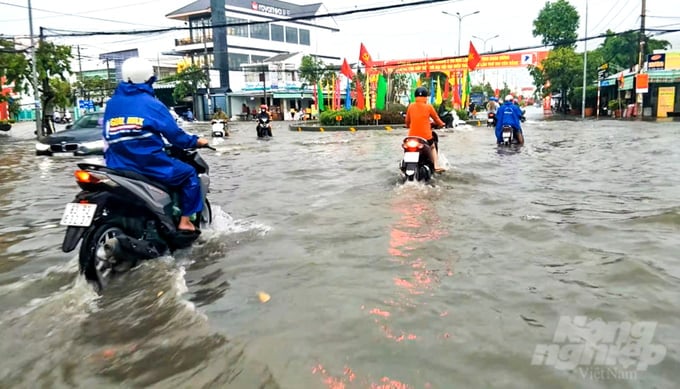June 20, 2025 | 22:52 GMT +7
June 20, 2025 | 22:52 GMT +7
Hotline: 0913.378.918
June 20, 2025 | 22:52 GMT +7
Hotline: 0913.378.918
Numerous directives and designs have been introduced over the past few years to enhance climate resilience within the Mekong Delta region, with a focus on the persisting issue of urban flooding. This challenge was raised by Mr. Pham Ngoc Mau, Deputy Director of the International Cooperation Department under the Ministry of Agriculture and Rural Development during the workshop on the Mekong Delta Climate Resilience Project (MCRP) Phase II, held on November 1 in Can Tho city.
Mr. Mau assessed that the impact of climate change on the Mekong Delta has been distinctly evident. As a result, local governments within the region need to provide necessary measures, management approaches, and individual responsibilities through the MCRP. This effort aims to contribute to the improvement of land, water, and brackish mangrove forest management in the Mekong Delta region, thereby facilitating its adaptation to climate change.

Mr. Pham Ngoc Mau, Deputy Director of the International Cooperation Department under the Ministry of Agriculture and Rural Development, acknowledged that the issue of urban flooding lacks fundamental solutions. Photo: Kim Anh
As a representative of the Project owner of MCRP, Mr. Mau expects that the project will be implemented in a practical and beneficial manner, wtih regards to the current state of disaster prevention and control in the Mekong Delta region.
Soc Trang city in Soc Trang province is an urban area within the Mekong Delta at high risk of flooding, with flooding levels ranging from 10 to 20%. Accordingly, the Soc Trang Provincial People's Committee has invested extensively in upgrading, renovating, and expanding the urban drainage system. However, these efforts have failed to meet ongoing demands.
According to Mr. Nguyen Hieu Nghia, Head of Urban Development and Technical Infrastructure under Soc Trang province's Department of Construction, the city's drainage system was established before 1975 and spans approximately 100 kilometers. The rapid process of urbanization has overloaded this system, causing a failure to ensure adequate water flow.
Heavy rainfalls in early October 2023 has submerged numerous main roads in Soc Trang city, causing partial flooding and impacting the mobility and transportation of goods for the residents in the central area.

The insufficient drainage capacity in Soc Trang city has resulted in localized urban flooding, which is further accentuated by heavy rainfall in combination with high tides. As a result, the mobility and daily lives of local residents were disrupted. Photo: Kim Anh.
Notably, whereas floodings may last three to six hours in the past, they can now presist for up to twelve hours. Mr. Nghia attributed the prolonged flood durations to the inadequate drainage capacity as well as the outdated design standards of the drainage system, which are no longer suitable for the current heavy rainfall and high tides.
According to the Soc Trang city General Planning Project approved in 2018, the city has studied solutions to adapt to climate change, including both structural and non-structural solutions. These solutions combine technical and landscape aspects aimed at developing green and smart urban areas. Six multi-purpose reservoirs were also planned to serve as water retention areas during heavy rainfalls and high tides.
Mr. Christoph Klinnert, Chief Advisor of the MCRP, emphasized that urban flooding and climate change are highly complex issues. MCRP has implemented various solutions for building urban infrastructure in response to climate change within the Mekong Delta region. This involves the simultaneous implementation of various systems such as permeable sidewalks, water storage, green roof systems, among many others. Accordingly, these solutions help urban areas adapt to the impacts of climate change and reduce the risk of flooding.

Mr. Christoph Klinnert, Chief Advisor of the MCRP Project, assessed that urban flooding is a highly complex issue, necessitating cohesive solutions to enhance urban resilience against the impacts of climate change. Photo: Kim Anh.
Furthermore, the MCRP Project also supports the integration of technical criteria into the urban drainage system planning.
"When these solutions are incorporated into the legal framework, the technical standards will have stronger impact, which will benefit not only the pilot provinces but also the entire Mekong Delta region," shared Mr. Christoph Klinnert.
Ca Mau province has recently invested in two temporary steel-gated structures. Accordingly, these structures utilize modern technologies to protect 120 hectares of agricultural land against saltwater intrusion, thereby ensuring livelihoods for over 80 local households. Additionally, 21 automatic water monitoring stations have been installed in the provinces of Soc Trang, Bac Lieu, and Ca Mau, providing real-time water data for agricultural production.
MCRP has been implemented by GIZ Vietnam in collaboration with Disaster and Dyke Management Authority across 13 provinces and cities within the Mekong Delta region since 2019.
The project, sponsored by the Swiss and German governments, aims to support management agencies in enhancing their climate change adaptation capacities within the Mekong Delta region through the establishment of a regulatory framework, thereby fostering regional development partnerships, and applying innovative technology solutions in both rural and urban areas.
Translated by Nguyen Hai Long
![Turning wind and rain into action: [9] Digitizing hydrometeorological data in response to climate change](https://t.ex-cdn.com/nongnghiepmoitruong.vn/608w/files/news/2025/06/17/z6704423696987_15fd32ffc26d590d204d520c9dac6786-nongnghiep-165943.jpg)
(VAN) Farmers have begun accessing hydrometeorological applications to adjust their cropping schedules, aiming to ensure productivity and adapt to climate change.
![Turning wind and rain into action: [8] Real-time salinity detection and early warning technology](https://t.ex-cdn.com/nongnghiepmoitruong.vn/608w/files/news/2025/06/17/z6704423696987_15fd32ffc26d590d204d520c9dac6786-nongnghiep-151127.jpg)
(VAN) Thanks to the integration of modern hydrological-hydraulic models, remote sensing technologies, and artificial intelligence, the accuracy of hydrological forecasting has significantly improved.
![Turning wind and rain into action: [7] Early disaster warnings help marine farmers minimize losses](https://t.ex-cdn.com/nongnghiepmoitruong.vn/608w/files/news/2025/06/17/z6704423696987_15fd32ffc26d590d204d520c9dac6786-nongnghiep-142942.jpg)
(VAN) In recent years, thanks to early disaster warnings and forecasting, marine farmers in Khanh Hoa province have been able to reduce risks and losses, thereby improving production efficiency.
![Turning wind and rain into action: [6] ‘Four on-the-spot’ disaster management software](https://t.ex-cdn.com/nongnghiepmoitruong.vn/608w/files/news/2025/06/17/e5a48259d6a262fc3bb3-nongnghiep-183800.jpg)
(VAN) By simply activating the scenario on the disaster management software, the relevant authorities immediately know how many households need to be evacuated, where to evacuate them to, and by what means of transportation…
![Turning wind and rain into action: [5] Hue applies modern technology in disaster forecasting](https://t.ex-cdn.com/nongnghiepmoitruong.vn/608w/files/news/2025/06/17/z6704423696987_15fd32ffc26d590d204d520c9dac6786-nongnghiep-093938.jpg)
(VAN) In Hue city, modern technology has recently been applied in meteorological and hydrological forecasting and warning, helping to reduce the damage caused by natural disasters.

(VAN) A cutting-edge farming technique being implemented on an experimental ranch in Arizona's Sonoran Desert has already saved a billion gallons of water over five years, according to Civil Eats.

(VAN) Poultry and pig production and the environment can be boosted through enhanced water technology, according to new research.